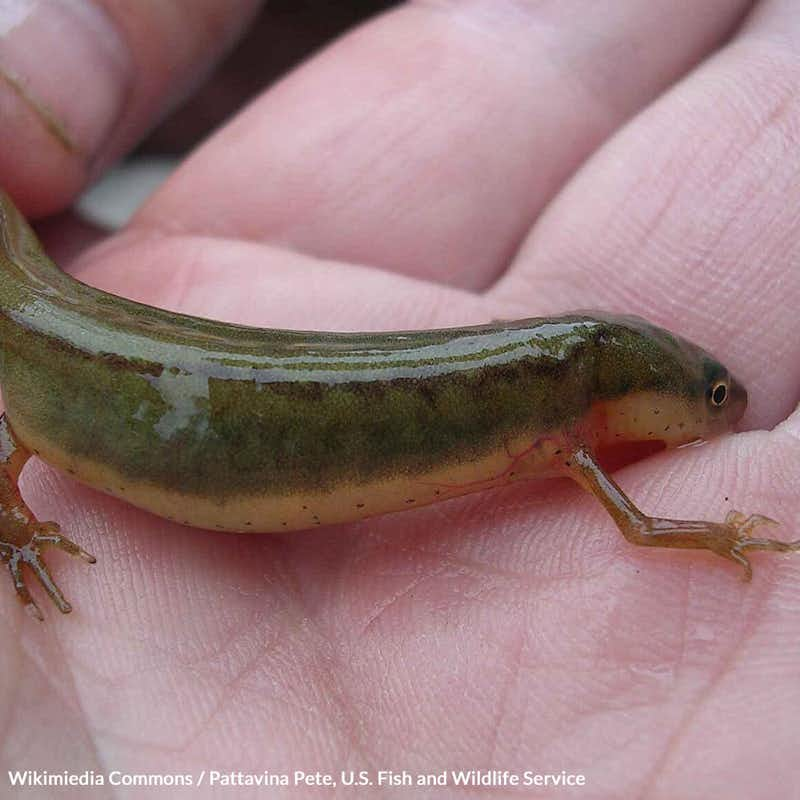Save The Striped Newt Before It's Wiped Out By Government Inaction
1,666 signatures toward our 30,000 Goal
Sponsor: The Animal Rescue Site
The striped newt is facing extinction, abandoned by those in power—act now to protect this fragile species from disappearing forever!

The striped newt, a small but vital amphibian native to the wetlands and longleaf pine forests of southeastern Georgia and north-central Florida, is on the verge of disappearing. Climate change, habitat destruction, and government inaction have left this species teetering on the brink of extinction. Without immediate intervention, the striped newt will be lost forever.
For over a decade, conservationists have been pushing for federal protection of the striped newt under the Endangered Species Act (ESA). Despite scientific evidence showing the species' rapid decline, the U.S. Fish and Wildlife Service (USFWS) recently denied the newt these critical protections. This decision has devastating consequences for the striped newt and the ecosystems it inhabits1.
The Striped Newt’s Fragile Existence
Striped newts rely on temporary ponds and longleaf pine forests to survive. They breed in ephemeral ponds that are free from predatory fish, which gives their larvae a fighting chance to mature. However, as climate change intensifies, these ponds are drying up before the larvae can develop. Droughts, increasingly frequent in the newt’s habitat, destroy critical breeding areas, leaving fewer newts to reach adulthood2.
Fire suppression, urban development, and logging have also decimated the longleaf pine forests that provide the upland habitat essential for newt survival. These habitats have been reduced by more than 97% due to human activities1. Without federal protections, the newt’s chances of survival diminish by the day.
Conservation Efforts Are Not Enough
Conservation groups such as the Coastal Plains Institute and the Detroit Zoological Society are working tirelessly to save the striped newt. Since 2017, these organizations have been breeding newts in captivity and releasing them into protected areas, such as the Apalachicola National Forest2. In 2023, over 200 newts were successfully reintroduced into the wild3. However, while these efforts are critical, they are not enough to halt the species' decline without stronger legal protections.
Even with successful reintroductions, the newt’s population continues to plummet. The absence of federal protection means that the habitats these newts rely on are still under threat from development and climate change. By granting the striped newt protection under the ESA, the USFWS could provide the necessary framework to preserve and restore its habitat4.
The Call for Federal Protection
The fight to save the striped newt is not just about protecting one species. It’s about preserving the biodiversity of our ecosystems. Wetlands like the ones where the newt breeds are critical for filtering drinking water, reducing flooding, and supporting countless other species. By protecting the newt, we protect these essential environments5.
Currently, the U.S. Fish and Wildlife Service’s decision leaves the newt without the protections it needs to survive. However, we have the power to change that. By signing our petition, you can urge the USFWS to reverse its decision and extend federal protections to the striped newt before it’s too late.
The time to act is now. Sign the petition and help save the striped newt from extinction.
- Chelsea Stewart-Fusek, Center for Biological Diversity (18 September 2024), "Lawsuit Launched to Protect Imperiled Striped Newt in Florida, Georgia."
- Mark Vassallo, Detroit Zoo Blog (26 January 2024), "Collaboration in Conservation: A Striped Newt's Story."
- Central Florida Zoo (11 July 2024), "Over 600 Striped Newts Released in Northern Florida."
- WSBTV, (19 September 2024), "Nonprofit Tells US Government It Plans to Sue Over Protections for Endangered Newt Species."
- Florida Fish and Wildlife Conservation Commission (2024), "Striped Newt."
The Petition:
To the Director of the U.S. Fish and Wildlife Service,
We, the undersigned, respectfully urge you to reconsider your recent decision to deny federal protection to the striped newt (Notophthalmus perstriatus) under the Endangered Species Act. This species, native to southeastern Georgia and north-central Florida, is teetering on the brink of extinction. Habitat loss due to urban development, agriculture, fire suppression, and climate change has led to a dramatic decline in striped newt populations, and without immediate intervention, this species may disappear forever.
The striped newt depends on fragile ecosystems, including temporary ponds and longleaf pine forests, both of which are increasingly threatened. The drying of breeding ponds due to prolonged droughts and the encroachment of urbanization are rapidly diminishing the remaining habitats necessary for the survival of this species. Despite these challenges, conservationists are fighting to restore populations through captive breeding and habitat preservation efforts. However, without federal protection, these efforts may not be enough.
We believe that by granting the striped newt protection under the Endangered Species Act, you will provide the necessary legal framework to safeguard critical habitats, allocate resources for restoration, and enforce conservation measures that could prevent the extinction of this unique species.
By taking swift action to reverse this decision, the U.S. Fish and Wildlife Service has the power to ensure that the striped newt is not lost to history. Federal protections will not only benefit the newt but will also help preserve the biodiverse ecosystems it inhabits, providing resilience against climate change and protecting other species that share these habitats.
Protecting the striped newt means protecting our shared environment for future generations. Let’s ensure a healthier, more biodiverse future for all by extending the protections necessary to save this imperiled species.
Sincerely,
 Welcome Back! Log In to Continue
Welcome Back! Log In to Continue